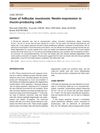5 citations,
September 2013 in “BMB Reports” BMPR1a-ECD reduces wrinkles much more effectively than retinoic acid.
 66 citations,
July 2015 in “Journal of Molecular Biology”
66 citations,
July 2015 in “Journal of Molecular Biology” The document concludes that for hair and feather growth, it's better to target the environment around stem cells than the cells themselves.
 65 citations,
July 2020 in “Science Advances”
65 citations,
July 2020 in “Science Advances” Dermal exosomes with miR-218-5p boost hair growth by controlling β-catenin signaling.
 88 citations,
January 2013 in “Indian Journal of Dermatology, Venereology and Leprology”
88 citations,
January 2013 in “Indian Journal of Dermatology, Venereology and Leprology” Minoxidil and finasteride effectively treat hair loss.
 April 2024 in “bioRxiv (Cold Spring Harbor Laboratory)”
April 2024 in “bioRxiv (Cold Spring Harbor Laboratory)” GRK2 is essential for healthy hair follicle function, and its absence can lead to hair loss and cysts.
 1 citations,
February 2018 in “Madridge journal of dermatology & research”
1 citations,
February 2018 in “Madridge journal of dermatology & research” The plant extract remedy Satura® Rosta promotes hair growth and regrowth without negative effects.
 316 citations,
June 2017 in “Stem Cell Research & Therapy”
316 citations,
June 2017 in “Stem Cell Research & Therapy” Fat tissue-derived cells show promise for repairing body tissues, but more research and regulation are needed for safe use.
 1 citations,
July 2009 in “Journal of dermatology”
1 citations,
July 2009 in “Journal of dermatology” A 29-year-old man had a jaw plaque diagnosed as follicular mucinosis, linked to nestin-positive hair follicle stem cells.
 8 citations,
August 2016 in “Journal of pathology and translational medicine”
8 citations,
August 2016 in “Journal of pathology and translational medicine” CD99 is highly present in certain skin cells and could help treat skin conditions.
 January 2018 in “Elsevier eBooks”
January 2018 in “Elsevier eBooks” The document concludes that alopecia has significant social and psychological effects, leading to a market for hair loss treatments.
 211 citations,
April 2013 in “Development”
211 citations,
April 2013 in “Development” More dermal papilla cells in hair follicles lead to larger, healthier hair, while fewer cells cause hair thinning and loss.
 384 citations,
June 2005 in “Genes & development”
384 citations,
June 2005 in “Genes & development” β-catenin is essential for stem cell activation and proliferation in hair follicles.
 85 citations,
September 2013 in “International Journal of Molecular Sciences”
85 citations,
September 2013 in “International Journal of Molecular Sciences” Keratin 15 is not a reliable sole marker for identifying epidermal stem cells because it's found in various cell types.
 17 citations,
February 2019 in “PubMed”
17 citations,
February 2019 in “PubMed” Stem cells can help regenerate hair follicles.
 26 citations,
July 2016 in “The journal of investigative dermatology/Journal of investigative dermatology”
26 citations,
July 2016 in “The journal of investigative dermatology/Journal of investigative dermatology” The protein Par3 is crucial for healthy skin, affecting the skin barrier, cell differentiation, and stem cell maintenance.
 January 2024 in “Theranostics”
January 2024 in “Theranostics” Exosomes from special stem cells help treat ulcerative colitis by reducing inflammation and stress.
 32 citations,
January 2012 in “Clinical & Developmental Immunology”
32 citations,
January 2012 in “Clinical & Developmental Immunology” Targeting CD200 could be a new treatment for rheumatoid arthritis.
 18 citations,
October 2017 in “PLOS ONE”
18 citations,
October 2017 in “PLOS ONE” The study concluded that similar pathways regulate hair growth in dogs and mice, and these pathways are disrupted in dogs with Alopecia X, affecting stem cells and hormone metabolism.
 74 citations,
January 2013 in “Expert Opinion on Biological Therapy”
74 citations,
January 2013 in “Expert Opinion on Biological Therapy” The conclusion is that hair growth can be improved by activating hair cycles, changing the surrounding environment, healing wounds to create new hair follicles, and using stem cell technology.
January 2022 in “Springer eBooks” Fibroblast growth factors are crucial for hair follicle development and regeneration.
 44 citations,
September 2019 in “The EMBO Journal”
44 citations,
September 2019 in “The EMBO Journal” Lymphatic vessels are essential for hair follicle growth and skin regeneration.
 September 2016 in “Journal of Dermatological Science”
September 2016 in “Journal of Dermatological Science” The protein aPKCλ is crucial for keeping hair follicle stem cells inactive and for hair growth and regeneration.
6 citations,
March 2018 in “The American journal of dermatopathology/American journal of dermatopathology” BerEP4 and CD34 staining can help tell apart tricholemmoma from basal cell carcinoma.

Stem cells regenerate tissues and their behavior varies by environment, suggesting the hematopoietic system model may need revision.
 68 citations,
August 2014 in “Stem Cells Translational Medicine”
68 citations,
August 2014 in “Stem Cells Translational Medicine” Dermal papilla cells help wounds heal better and can potentially grow new hair.
 9 citations,
April 2019 in “Molecules”
9 citations,
April 2019 in “Molecules” Blackcurrant extract may help reduce hair loss by promoting stem cell activity in hair follicles.
 January 2025 in “Cellular and Molecular Life Sciences”
January 2025 in “Cellular and Molecular Life Sciences” BMP4 helps stem cells turn into pigment-producing cells, affecting hair color and growth.
 6 citations,
January 2015 in “Evidence-based Complementary and Alternative Medicine”
6 citations,
January 2015 in “Evidence-based Complementary and Alternative Medicine” Saw palmetto extract may help treat brain tumors by blocking a specific growth signal and blood vessel formation.
 November 2021 in “Current Otorhinolaryngology Reports”
November 2021 in “Current Otorhinolaryngology Reports” New treatments for hair loss could involve using stem cells and a process called the Wnt/beta-catenin pathway to stimulate hair growth.
4 citations,
January 2017 in “Journal of veterinary medical science” A dog had a rare skin tumor called desmoplastic tricholemmoma.

























